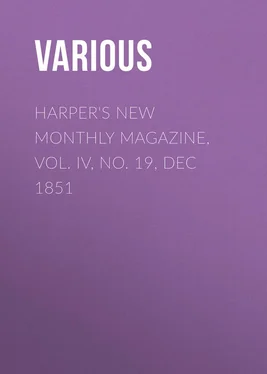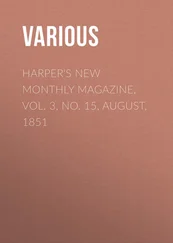Various - Harper's New Monthly Magazine, Vol. IV, No. 19, Dec 1851
Здесь есть возможность читать онлайн «Various - Harper's New Monthly Magazine, Vol. IV, No. 19, Dec 1851» — ознакомительный отрывок электронной книги совершенно бесплатно, а после прочтения отрывка купить полную версию. В некоторых случаях можно слушать аудио, скачать через торрент в формате fb2 и присутствует краткое содержание. Издательство: Иностранный паблик, Жанр: periodic, foreign_edu, на английском языке. Описание произведения, (предисловие) а так же отзывы посетителей доступны на портале библиотеки ЛибКат.
- Название:Harper's New Monthly Magazine, Vol. IV, No. 19, Dec 1851
- Автор:
- Издательство:Иностранный паблик
- Жанр:
- Год:неизвестен
- ISBN:нет данных
- Рейтинг книги:5 / 5. Голосов: 1
-
Избранное:Добавить в избранное
- Отзывы:
-
Ваша оценка:
- 100
- 1
- 2
- 3
- 4
- 5
Harper's New Monthly Magazine, Vol. IV, No. 19, Dec 1851: краткое содержание, описание и аннотация
Предлагаем к чтению аннотацию, описание, краткое содержание или предисловие (зависит от того, что написал сам автор книги «Harper's New Monthly Magazine, Vol. IV, No. 19, Dec 1851»). Если вы не нашли необходимую информацию о книге — напишите в комментариях, мы постараемся отыскать её.
Harper's New Monthly Magazine, Vol. IV, No. 19, Dec 1851 — читать онлайн ознакомительный отрывок
Ниже представлен текст книги, разбитый по страницам. Система сохранения места последней прочитанной страницы, позволяет с удобством читать онлайн бесплатно книгу «Harper's New Monthly Magazine, Vol. IV, No. 19, Dec 1851», без необходимости каждый раз заново искать на чём Вы остановились. Поставьте закладку, и сможете в любой момент перейти на страницу, на которой закончили чтение.
Интервал:
Закладка:
But the most interesting, and at the same time most melancholy traces of the navigators, were three graves , in a little sheltered cove, each with a board at the head, bearing the name of the sleeper below. These inscriptions testify positively when Sir John and his companions were there. The board at the head of the grave on the left has the following inscription:
"Sacred to the memory of John Torrington, who departed this life, January 1st, a. d., 1846, on board her Majesty's ship Terror , aged 20 years."
On the centre one – "Sacred to the memory of John Hartnell, A. B., of her Majesty's ship Erebus ; died, January 4th, 1846, aged 25 years. 'Thus saith the Lord of Hosts, Consider your ways:' Haggai, chap. i. v. 7."
On the right – "Sacred to the memory of W. Braine, R. M., of her Majesty's ship Erebus , who died April 3d, 1846, aged 32 years. 'Choose you this day whom you will serve:' Joshua, chap. xxiv., part of the 15th verse."
How much later than April 3d (the date upon the last-named head-board), Sir John remained at Beechy, can not be determined. They saw evidences of his having gone northward, for sledge tracks in that direction were very visible. It is the opinion of Dr. Kane that, on the breaking up of the ice, in the spring, Sir John passed northward with his ships through Wellington Channel, into the great Polar basin, and that he did not return. This, too, is the opinion of Captain Penny, and he zealously urges the British government to send a powerful screw steamer to pass through that channel, and explore the theoretically more hospitable coasts beyond. This will doubtless be undertaken another season, it being the opinions of Captains Parry, Beechy, Sir John Ross, and others, expressed at a conference with the Board of Admiralty, in September, that the season was too far advanced to attempt it the present year. Dr. Kane, in a letter to Mr. Grinnell, since the return of the expedition, thus expresses his opinion concerning the safety of Sir John and his companions. After saying, "I should think that he is now to be sought for north and west of Cornwallis Island," he adds, "as to the chance of the destruction of his party by the casualties of ice, the return of our own party after something more than the usual share of them, is the only fact that I can add to what we knew when we set out. The hazards from cold and privation of food may be almost looked upon as subordinate. The snow-hut, the fire and light from the moss-lamp fed with blubber, the seal, the narwhal, the white whale, and occasionally abundant stores of migratory birds, would sustain vigorous life. The scurvy, the worst visitation of explorers deprived of permanent quarters, is more rare in the depths of a Polar winter, than in the milder weather of the moist summer; and our two little vessels encountered both seasons without losing a man."
Leaving Beechy Cape, our expedition forced its way through the ice to Barlow's Inlet, where they narrowly escaped being frozen in for the winter. They endeavored to enter the Inlet, for the purpose of making it their winter quarters, but were prevented by the mass of pack-ice at its entrance. It was on the 4th of September, 1850, when they arrived there, and after remaining seven or eight days, they abandoned the attempt to enter. On the right and left of the above picture, are seen the dark rocks at the entrance of the Inlet, and in the centre the frozen waters and the range of hills beyond. There was much smooth ice within the Inlet, and while the vessels lay anchored to the "field," officers and crew exercised and amused themselves by skating. On the left of the Inlet, (indicated by the dark conical object,) they discovered a Cairn (a heap of stones with a cavity) eight or ten feet in height, which was erected by Captain Ommanny of the English Expedition then in the Polar waters. Within it he had placed two letters, for "whom it might concern." Commander De Haven also deposited a letter there. It is believed to be the only post-office in the world, free for the use of all nations. The rocks, here, presented vast fissures made by the frost; and at the foot of the cliff on the right, that powerful agent had cast down vast heaps of debris .
From Barlow's Inlet, our Expedition moved slowly westward, battling with the ice every rood of the way, until they reached Griffin's Island, at about 96° west longitude from Greenwich. This was attained on the 11th, and was the extreme westing made by the expedition. All beyond seemed impenetrable ice; and, despairing of making any further discoveries before the winter should set in, they resolved to return home. Turning eastward, they hoped to reach Davis's Straits by the southern route, before the cold and darkness came on, but they were doomed to disappointment. Near the entrance to Wellington Channel they became completely locked in by hummock-ice , and soon found themselves drifting with an irresistible tide up that channel toward the pole.
Now began the most perilous adventures of the navigators. The summer day was drawing to a close; the diurnal visits of the pale sun were rapidly shortening, and soon the long polar night, with all its darkness and horrors, would fall upon them. Slowly they drifted in those vast fields of ice, whither, or to what result, they knew not. Locked in the moving yet compact mass; liable every moment to be crushed; far away from land; the mercury sinking daily lower and lower from the zero figure, toward the point where that metal freezes, they felt small hope of ever reaching home again. Yet they prepared for winter comforts and winter sports, as cheerfully as if lying safe in Barlow's Inlet. As the winter advanced, the crews of both vessels went on board the larger one. They unshipped the rudders of each to prevent their being injured by the ice, covered the deck of the Advance with felt, prepared their stores, and made arrangements for enduring the long winter, now upon them. Physical and mental activity being necessary for the preservation of health, they daily exercised in the open air for several hours. They built ice huts, hunted the huge white bears and the little polar foxes, and when the darkness of the winter night had spread over them, they arranged in-door amusements and employments.
Before the end of October, the sun made its appearance for the last time, and the awful polar night closed in. Early in November they wholly abandoned the Rescue , and both crews made the Advance their permanent winter home. The cold soon became intense; the mercury congealed, and the spirit thermometer indicated 46° below zero! Its average range was 30° to 35°. They had drifted helplessly up Wellington Channel as high as the point 4. on the map, almost to the latitude from whence Captain Penny saw an open sea, and which all believe to be the great polar basin, where there is a more genial clime than that which intervenes between the Arctic Circle and the 75th degree. Here, when almost in sight of the open ocean, that mighty polar tide, with its vast masses of ice, suddenly ebbed, and our little vessels were carried back as resistlessly as before, through Barrow's Straits into Lancaster Sound! All this while the immense fields of hummock-ice were moving, and the vessels were in hourly danger of being crushed and destroyed. At length, while drifting through Barrow's Straits, the congealed mass, as if crushed together by the opposite shores, became more compact, and the Advance was elevated almost seven feet by the stern, and keeled two feet eight inches, starboard, as seen in the engraving. In this position she remained, with very little alteration, for five consecutive months; for, soon after entering Baffin's Bay in the midst of the winter, the ice became frozen in one immense tract, covering millions of acres. Thus frozen in, sometimes more than a hundred miles from land, they drifted slowly along the southwest coast of Baffin's Bay, a distance of more than a thousand miles from Wellington Channel. For eleven weeks that dreary night continued, and during that time the disc of the sun was never seen above the horizon. Yet nature was not wholly forbidding in aspect. Sometimes the Aurora Borealis would flash up still further northward; and sometimes Aurora Parhelia – mock suns and mock moons – would appear in varied beauty in the starry sky. Brilliant, too, were the northern constellations; and when the real moon was at its full, it made its stately circuit in the heavens without descending below the horizon, and lighted up the vast piles of ice with a pale lustre, almost as great as the morning twilights of more genial skies.
Читать дальшеИнтервал:
Закладка:
Похожие книги на «Harper's New Monthly Magazine, Vol. IV, No. 19, Dec 1851»
Представляем Вашему вниманию похожие книги на «Harper's New Monthly Magazine, Vol. IV, No. 19, Dec 1851» списком для выбора. Мы отобрали схожую по названию и смыслу литературу в надежде предоставить читателям больше вариантов отыскать новые, интересные, ещё непрочитанные произведения.
Обсуждение, отзывы о книге «Harper's New Monthly Magazine, Vol. IV, No. 19, Dec 1851» и просто собственные мнения читателей. Оставьте ваши комментарии, напишите, что Вы думаете о произведении, его смысле или главных героях. Укажите что конкретно понравилось, а что нет, и почему Вы так считаете.












